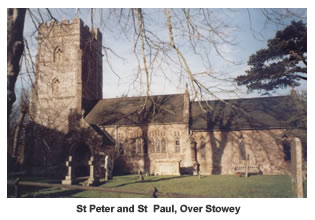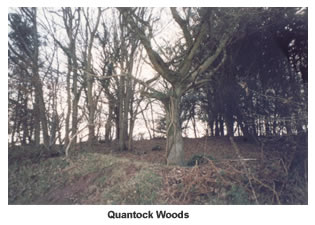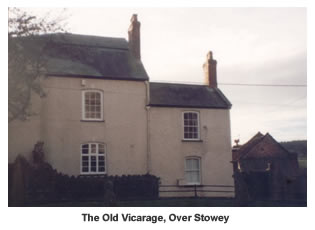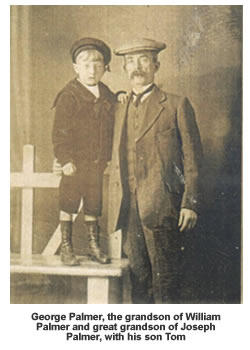The Vicar vs a “wild set of People”.
When the Reverend William Holland became Parson of Over Stowey in Somerset in 1779 my ancestors, the Palmers, had already been living in the Parish for at least a century. William kept a daily diary, extracts from which have been published as “Paupers and Pig Killers, Diaries of a Somerset Parson 1799 – 1808” edited by Jack Ayers. Jack describes William as a man with “a dislike or hatred of all Democrats, Methodists, and Catholics”. He didn’t like the Palmers much either. They were in good company, however, as William had a very low opinion of the renowned poet Samuel Taylor Coleridge. “October 23: Saw that Democratic Hoyden Mrs Coleridge who looked so like a friskey girl or something worse that I was not surprised that a Democratic Libertine should choose her for a wife.”

Parson William encountered the Palmers several times – this is the first recorded occasion.
Monday May 7 1804: On our way home we encountered an adventure at Ely Green, a great noise and two fighting, Jack Hunt and John Palmer. I spoke to them and they were seperated but I believe fell to again. I ordered a Constable to be sent for which I believe was done. The man of Ely Green spoke to me and said he could not prevent it and said that he had turned them out of his house. A man better dressed than usual followed us and spoke in favour of the Landlord and very civilly wished us goodnight, but who he was I cannot tell.
John didn’t learn the error of his ways:
From Somerset RO Q/AGi 15/1 admission of prisoners to Ilminster Jail
John Palmer aged 40 height 5′ 7″ dark complex, dark hair, hazel eyes, mark on hand, born Over Stowey, Carrier, living Over Stowey, can read, married, six children, 4 months.
I have yet to discover why John was sent to jail.
The Palmers were brush makers and although my gt x 2 grandfather Arthur was working as a miner in Ebbw Vale by 1851 many of his Palmer cousins back in Somerset were still following the trade. William Holland describes the occupation in his diary.

Sunday February 8, 1807: A great many of the Broom Squires as they call them were at Church. A wild set of people heretofore never coming near any place of worship. I am glad they now come to church and seem well dressed. They live on making brooms and carrying them to Taunton. Their brooms are made of Heath.
Perhaps the Palmers weren’t among this group as William was not impressed with my gt x 3 grandfather’s dress sense some two years later.
Sunday October 8, 1809: Just as I was preparing to go to Dodington the clerk came in to say that Palmer would marry the woman, the woman that had been asked out six times. I cannot do this today said I, I am going to Dodington, but recollecting that this was a slippery gentleman and only proposed the thing because he supposed I would not marry them I was determined to nick the gentleman and said I would marry them. So he came, but in his worst clothes and behaved so indifferently that I was obliged to reprimand him.
And so it was that William Palmer married Sarah Chedzey. The consensus is that “asked out” means that the banns had been read. They obviously didn’t like to rush things. A Farmer Chedzey was buried less than a month later in a church “very much crouded” so maybe great great great grandfather William had been persuaded to legalise his relationship in expectation of a legacy.
This was a very unpopular Act and there was much resistance among the “common people”. These tithes allowed William Holland to live in comfort while his parishioners lived in poverty. William was prone to gout, digestive upsets and “complaints in my bowels” the poor man was also a martyr to constipation. In September 1808 he held a supper to celebrate the tithes all being in and suffered for several days afterwards until he was “obliged to send for Mr Bennett who relieved me at last but I must guard against it in future.”
He didn’t learn his lesson as a month later, Saturday October 17: Last night I took a large dose of Rhubarb and worked it off this morning. Mr Atherston called and I was well but then the dose continued working afterwards to such a degree that I began to find myself faint and went on to bed. It was too great a dose.
As his overindulgence was at the expense of my ancestors I find it hard to feel much sympathy for him.
On Wednesday January 22nd, 1812 William was riding to Crowcombe when he saw some Broom Squires making up an enclosure to plant potatoes. Know you said I that you must pay tithe. We intend it answered they. They told me that Palmers were sent to jail for stealing wood.

At the January Sessions William Palmer and his parents Joseph and Mary (my 4 x gt grandparents) were sentenced to one month in jail for larceny. William had been acquitted of a similar charge in 1806 but in 1815 Joseph was again sentenced, this time for three months. I’d like to think the theft of wood was a political protest against the tithe but it probably wasn’t. These sentences explain in part why William Palmer abandoned the family business and became a miner in Backwell, where my gt x 2 grandfather, Arthur, was born in 1814.
Some of the Palmers learned it was as well to stay on the good side of William Holland. Thomas, who I believe was brother to William Palmer, had learned how to handle the vicar.
Thursday October 21, 1813: I rode out this day thro Stowey and then up the Hill. Thomas Palmer, a Broomer, was unwilling to pay his tithe from land inclosed on Quantock, but he has now paid so as I passed I called to him. – Now you begin to pay your tithe you’ll have a good crop and prosper. He smiled and said he hoped he would. An elderly woman in the field said I do not grudge it at all for you be a Good Kind of Gentleman.
Am I alone in detecting some 19th Century sarcasm here?
The Palmers knew how to do some things in style:
Sunday June 9, 1811: In the afternoon we had a very full church. They bought a corpse from Spaxton, a pauper, and yet it was astonishing what a number of people attended. The brother, a Palmer, was at the expence which indeed was generous. The coffin was very handsome indeed.
Sadly William’s high opinion of them lasted less than a week.
Sunday June 16, 1811 We had here the Church very full in the afternoon, several persons from other parishes having come on account of the woman that was lately buried, one of the Palmers and so all the Broom Squires were at Church and some of them I believe had not been at Church since they were Christened. One man absolutely kneeled down at the time through Ignorance of what he was to do.
By the time my grandmother Maria Palmer was born in Ebbw Vale in 1893 the rest of the family had all signed the pledge and joined the Band of Hope. My Aunt assures me that the Palmers had been “Methodist to the bone” for many years. Were they of that persuasion before William Holland arrived in Over Stowey – or did he drive them to it?
Before leaving William’s diaries I must mention my absolute favourite entry: that for Wednesday November 1, 1809, a month after the marriage of William Palmer and Sarah Chedzey. Great great great great grandfather Joseph Palmer called at the vicarage:
…. Joseph Palmer, a savage looking fellow came here to pay Tithe as I had threatened him. Then I asked him what he thought of another World. He answered that he was no Scholard. I do not presume you are but it is proper you should know that there are two places, there was one for the Good and another for the Bad. Then I talked to him seriously so that he began to wish himself out of hearing but I would not let him go. At last I told him that I did not value his Tithe and if he promised to come to Church I would take but one shilling from him instead of two. He smiled at this. Do so returned I and now before Clerk Dyer it is a bargain, if you come to Church I take one shilling but if you do not I will have two. So we parted. These Broom Squires as they call them have no Religion and I do not ever remember seeing this man at Church, so we shall see what he will do.
Joseph died in 1833 and was buried in neighbouring Frairn, so I think we can guess what he did. I’d have wished myself several miles out of hearing of one of William’s diatribes as well.

Joseph’s son William Palmer and his grandson George were buried on the same day October 2nd 1836. Their tragic deaths were reported in the newspapers of the time:
From The Times – Saturday, October 1, 1836: On Wednesday last a fatal accident occured in one of the coal pits near Backwell Somerset. The men had given notice to be drawn up, and had ascended the shaft about 30 feet in the usual manner, when the rope broke nearly at the surface, precipitating the unfortunate men to the bottom, and they were all deprived of life. The head of one of them was completely smashed.
From the Western Flying Post, Sherbourne and Yeovil Mercury (September 1836)
Dreadful Accident – Four Lives Lost
On Wednesday last a fatal accident occured in one of the coal pits near Backwell Somerset. The men had given notice to be drawn up, and had ascended the shaft about 30 feet in the usual manner, when the rope broke nearly at the surface, precipitating the unfortunate men to the bottom, and, melancholy to add, they were all deprived of life. The head of one of them was completely smashed. The names of the sufferers are Abraham Widcome, aged 24, George Noble, 39, William Palmer, 52; and his son George Palmer, 15.
William’s son Arthur died in his bed of senile decay in 1888 in Waunllwyd, Aberystruth. His son George, also a coal miner, married a Welsh speaking girl from Llanelli, Brecknock and they raised ten children to adulthood. Maria Palmer married William Cottle, a master boiler maker at the steelworks at Ebbw Vale and in the 1920s they moved, with their three children, to Barry, Glamorgan where William became a foreman in the GWR works near the docks. Here they had one more child. Their three daughters all became teachers as did their granddaughter, Gwynneth, daughter of their oldest child, Iris. William Cottle became an elder of Trinity Presbyterian Church and Maria a leading light in the sisterhood. As far as I can remember they always knew how to behave in church and were always well turned out.
Some Palmers stayed behind in Somerset.
In 1952 Berta Lawrence wrote in “Quantock Country”, Several charcoal pits are still visible in the wild combe called Five Lords above the cottage of Mr Palmer the last Quantock broom-squire and not far from Walford’s Gibbet*, the execution place of a charcoal burner.
Guinevere
© Guinevere July 21, 2001
* John Walford, a charcoal burner was hanged for the murder of his wife and his body gibbeted for a year. He was almost certainly cousin to William Palmer’s mother in law Elinor Chedzey (née Walford). The story of the murder and John’s trial were written about by Wordsworth, Coleridge and local diarist Thomas Poole.